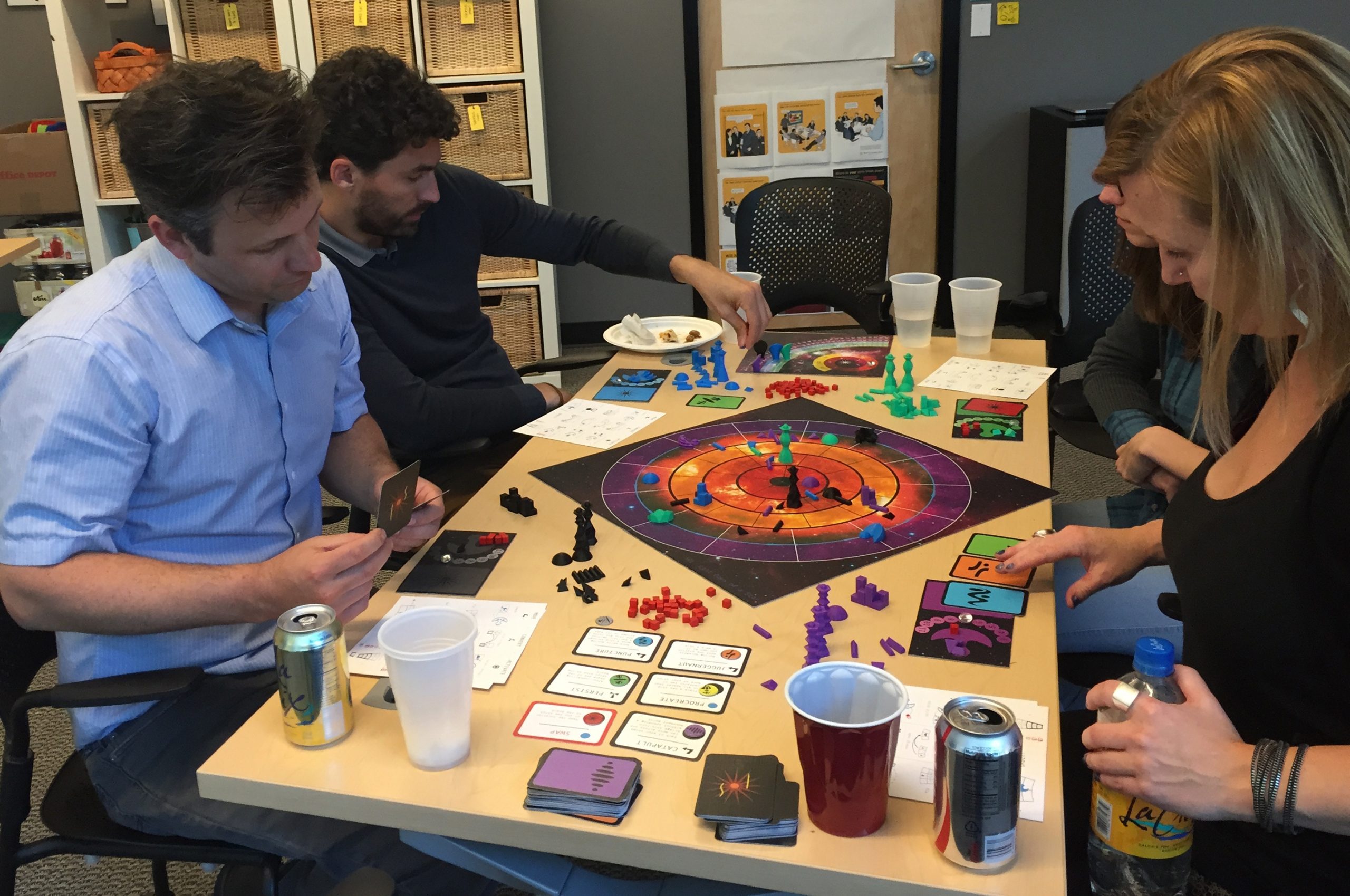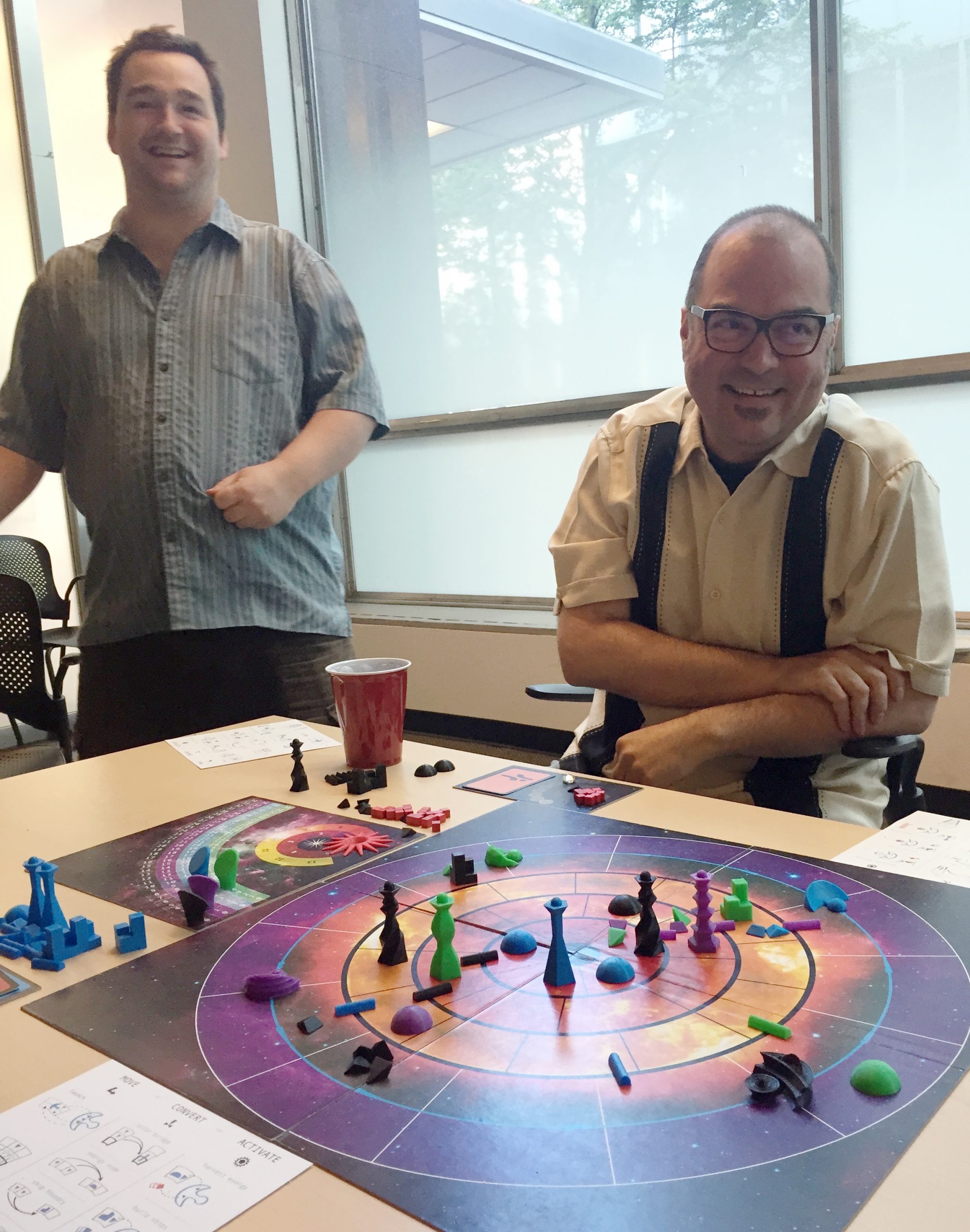The sun is dying, and the various inhabitants of the planets in this solar system are launching one last effort to save everything. How will you strategically harness enough energy to successfully save your people before the sun explodes?
This is the premise of Sol: Last Days of a Star, an intense, immersive board game created by Elephant Laboratories brother-duo Ryan and Sean Spangler. Last month, a few of our XPLANErs joined forces with Portland’s Elephant Labs to dive into the depths of Sol; demo the game before it hits the public; hear some cool tips on game design from these gaming experts; and chat with game-creator Ryan about his process, experience with game design, and life.
Why would you want to design a game AT ALL?
There is something very different about game design as an art. Like painting, it has a visual aspect, and like writing, there can be a narrative that ties everything together. The key to a game is that it has participants. A game is an interactive art form that unfolds from the decisions the players make, and each game presents the players with a unique structure of what decisions are available at any time. When you are designing a game, you are in essence sculpting this intangible thing I call the “decision space.” You don’t touch it, see it, or hear it… but when you sit down to play the game, it becomes immediate and palpable. The players are navigating through this space that has been curated for them, but their decisions create the narrative and the sequence of events. This is why creating a game is so interesting: It is creating an interactive world the players can inhabit. It feels like the activity of living.
You can also convey something through a game that is learned through interaction rather than being predefined. What is transmitted in a game is the dynamics, the relationship between action and consequences.

Did you always know you wanted to design games?
I’ve been playing games since before I can remember. My dad had (and still has) a giant collection of old board games, many of them elaborate and sprawling. My older brother and I grew up in a laboratory of creativity. We would play games, change the rules, make up our own games out of the same bits, combine multiple parts from different games, write things on pieces of cardboard, and make the rules up as we went along. It is pretty much all we did. We also did everything else: from claymation videos to music composition to elaborate storytelling. So, yes, I always knew to some degree. I have managed to find a way to continue this line of unreserved creativity long into adulthood with music, code, painting, and games. I don’t see how that will ever stop.
How long and how many revisions has it taken you to get Sol to this state?
My brother and I have been working on Sol for almost two years now. The whole thing came from the idea that we just wanted a game where the board was the sun. Our first concept was elaborate and ambitious, and when we sat down, we discovered that we couldn’t play it. This was when it first became clear to me the difference between an idea and something that can be played. So we threw the whole thing away and came up with the simplest mechanic that we could actually play. It was so limited and narrow, but at least we could play it. Then, the process became iteration. In the beginning, the game would change almost completely after every session we had. As we went along, things would change less and less. It is almost like it found a voice of its own—we weren’t so much creating it as discovering the game it wanted to be. Finally, we would go through long stretches without changing anything, just little tweaks here and there. So, how many revisions? I don’t know … countless. But in the end it became its own thing—we were just like shepherds guiding it along a path of its own ultimate choosing.

What was the biggest pain point and the biggest euphoric moment in the making of Sol?
The biggest pain point has definitely been figuring out everything else that is not strictly about designing the game. The creative process is amazing; figuring out how to manufacture pieces, gain exposure, work out the art, and everything else has been a huge learning experience. I had no idea how much work went into building and producing a physical product before we started the project.
But seeing it all come together and seeing the game in the hands of people who are loving the hell out of it—there’s nothing better. Also, becoming part of the game design community here in Portland has been astounding. Meeting people I would never have otherwise met if we were not committed to a common goal, and collectively working towards that goal, is an amazing experience.
What surprised you the most about designing this game?
I think the most surprising thing is how the game has a life of its own. Sometimes in the creative process you really drive the end result, and it becomes an extension of yourself. In designing Sol, I feel it was more akin to watching something being born. In the end, I just stand back and marvel and wonder how something like that could come into existence.

When will Sol hit Kickstarter.com, and what’s your goal?
It turns out running a Kickstarter.com is a huge project. We are trying to balance getting the game out there with not wanting to release it before we have the community established. As it is now, we are looking at October for a release date. The goal, to cover everything, is going to be $35-40 thousand. Sol has a lot of pieces and components, so we are going to need something moderately substantial to pull it off. We have talked to the manufacturers and have quotes and a clear picture of what it is going to take. Now, for the execution.
How many more games do you have in you?
Well, it all depends on how long I live. The process of designing Sol has given me a foundation for turning game ideas into reality. Since then, we have two other solid designs and a number of others in various stages.
And I come up with new ideas every day. The challenge is choosing which ones to focus on! Oh man, if I get to make all these games it will be amazing.
